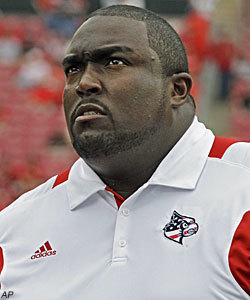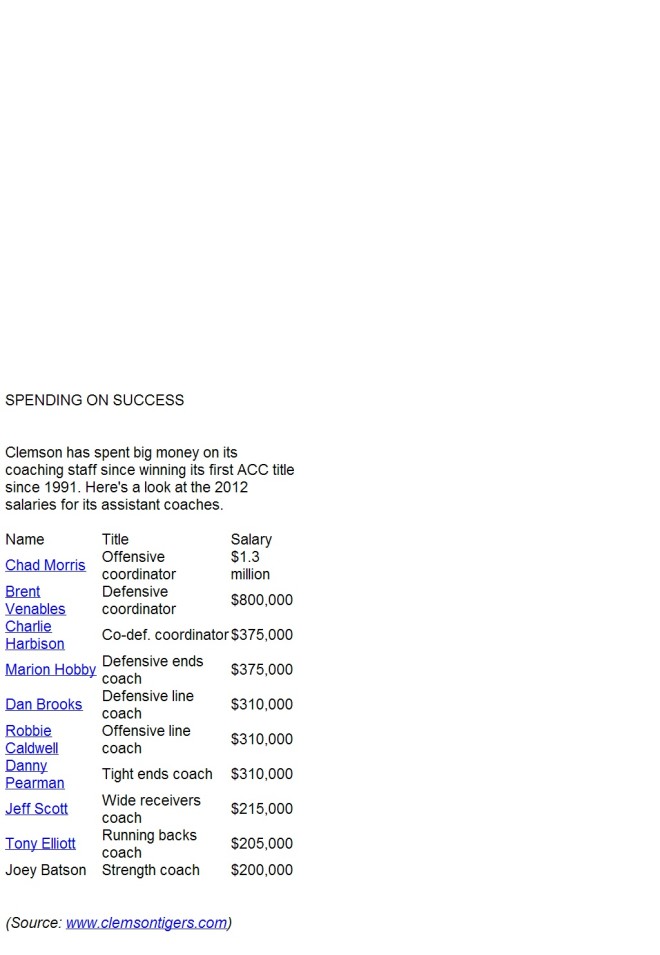Big-money recruiting wars on rise for assistants

Clemson has long prided itself as a potential national power, even though its ACC title last year was its first since 1991.
Now the Tigers are backing up their big talk with big bucks.
Advertisement
Just as rumors began circulating last December that Urban Meyer was interested in bringing Tigers offensive coordinator Chad Morris to Ohio State, Clemson gave Morris a pay raise that awarded him a reported annual salary of $1.3 million, making him the nation's highest-paid offensive coordinator.
Clemson hasn't stopped spending since.
After they suffered an embarrassing 70-33 loss to West Virginia in the Orange Bowl, the Tigers parted ways with defensive coordinator Kevin Steele and hired Brent Venables by paying him a reported $800,000 per year, about $300,000 more than he received last year for doing the same job at Oklahoma.
If that weren't enough, Clemson officials announced just this week that seven more assistant coaches and head strength coach Joey Batson would receive a combined total of $450,000 in raises. Clemson is expected to pay its nine full-time assistants a total of $4.2 million next season, a figure that moves up to $4.4 million once Batson's salary is added.
"It's important to me that we have a staff that's competitive with everybody out there in the country because our goal is to be the best," Swinney said. "It's as simple as that. I'm not interested in just being the best in the ACC. We did that this year. I want to be the best in the country. That's the arena I want to play in, and that's how we have to invest if we're going to get there."
There's plenty of evidence that spending big money on assistant coaches can have an impact on the field. USA Today published the 2011 salaries for assistant coaches at 97 of the 120 FBS programs and revealed that six of those schools paid over $3 million to their assistants. Two of those six schools - Alabama and LSU - faced off in the BCS championship game.
Swinney believes investing heavily in assistants also can pay off on the recruiting trail.
"It gives you even more credibility from a recruiting standpoint, that not only we can recruit the best players here to Clemson," Swinney said. "We [also] can recruit the best coaches - and keep the best coaches. That's exciting."
[ More Clemson: TigerIllustrated.com ]
It's too early to tell whether Clemson's ability to keep Morris and add Venables actually has helped the Tigers attract recruits.
Nineteen of the 20 players in Clemson's 2012 recruiting class verbally committed by mid-October. They had made up their minds long before Venables arrived at Clemson or Morris received his raise.
Many of the 2013 prospects are too early in their college selection process to worry about coaching moves that schools have made in the offseason. Charlotte (N.C.) Vance linebacker Larenz Bryant visited Clemson two weeks ago and has interest in playing there, but he said the Tigers' big investment in assistants probably wouldn't influence his college choice.
"No, sir," said Bryant, the No. 95 overall prospect in the 2013 class. "It's about my major and my feeling about the school."

Other 2013 recruits have a different take.
Matthews (N.C.) Butler linebacker Peter Kalambayi said he had communicated with Venables when the coach was still working at Oklahoma. Kalambayi, the No. 62 prospect in the 2013 class, was surprised Clemson lured Venables away from the Sooners.
"It has a pretty big impact," said Kalambayi, who remains uncommitted. "You want to get coached by the best guys."
Prospects also want to have some familiarity with their future coaches.
For example, Lawrenceville (Ga.) Central Gwinnett linebacker Trey Johnson attends the same high school that produced former Auburn defensive coordinator Ted Roof. Just about every day, Johnson can see Roof's picture in the Central Gwinnett locker room.
Johnson, the No. 36 overall 2013 recruit, verbally committed to Auburn after establishing a bond with Roof. When Roof left Auburn at the end of the regular season for UCF (Penn State would hire him away from UCF a month later), Johnson began to rethink his decision.
Auburn probably needed to make a splash in selecting Roof's replacement. That's exactly what Gene Chizik did by hiring Atlanta Falcons defensive coordinator Brian VanGorder.
"It all depended on who they brought in," said Johnson, who stayed committed to Auburn. "I really wanted to see who it was they brought in. When they brought in Coach VanGorder from the Falcons, since I live in Atlanta, I've seen him on TV a bunch of times. Bringing him in was pretty good."
VanGorder made the move from the NFL back to college for a multiyear deal worth reportedly $850,000 annually, $350,000 more than Roof earned last season.
This isn't the first time Auburn has spent big money on a coordinator.
Gus Malzahn received $1.3 million as Auburn's offensive coordinator last year after rejecting overtures to become Vanderbilt's head coach. Malzahn still left at the end of the 2011 season to take over Arkansas State's program. The combined salaries of Auburn's assistants last year were the highest of any team included in the USA Today report, which estimated their total at just below $4.2 million.
The seven-figure salaries that Malzahn received last year and Morris will earn this season underscore the importance of hanging on to top assistants. No matter how much recruits are told to pick a school based on its own merits since coaches could come and go at any time, all too often they make their selection because of a rapport they've established with a particular coach.
"Ninety-nine percent of the kids across the country, when they pick a school, they're picking because of the assistant coach who's recruiting them and the head coach who comes to sit down with their family at the end of the day," Louisville defensive line coach and recruiting coordinator Clint Hurtt said. "If people want to believe it has something to do with the school, that's the furthest thing from the truth. If a kid loves the school, he loves the school for the past football players who have played at that university and that won a lot of games and that had a lot of success. And that comes back to the relationship with the coaches.
"There are a lot of things that get said in the game in terms of, 'I picked this school because they have a great business school.' Let me tell you something, one of every 100 kids you recruit, they really mean that when they say it. What it really comes down to is the quality of the football program, how much are they going to play and what their impact could be if they decide to go to school there and the relationship with the coaching staff and how they're going to be utilized. That's the 100 percent truth."
One look at the Pac-12 drives that point home.
California was on the verge of attracting its most star-studded recruiting class in school history before defensive line coach Tosh Lupoi - the 2010 Rivals.com National Recruiter of the Year - left for a similar position at Washington two weeks before National Signing Day. Lupoi reportedly had made $164,000 annually at California and will receive $416,000 per season at Washington.
After Lupoi's departure, a California class that seemed on track to rank in the top 10 nationally finished 23rd overall and sixth in the Pac-12. The Golden Bears had made headlines during the Army All-America Bowl when five-star safety Shaq Thompson, five-star defensive tackle Ellis McCarthy and Rivals100 receiver Jordan Payton verbally committed to California. All three ended up signing with Pac-12 rivals - McCarthy and Payton at UCLA and Thompson at Washington.

Click Here to view this Link.
"It was such a big deal, so close to Signing Day and the guy flipped for so much more money," said Mike Farrell, the national recruiting analyst for Rivals.com. "I think that will probably start a little bit of a trend and a bidding war for some of these guys, but Lupoi was a special situation. He's probably the best recruiter/assistant coach in the country over the last three years."
There might not be many other Lupois out there, but that won't stop schools from spending heavily on assistant coaches. The USA Today report noted that the average salary for an FBS assistant coach in 2011 was $182,000, an increase of almost 11 percent from the previous year.
Swinney understood the value of a quality assistant before he even began his head coaching career.
When Clemson named him the school's permanent head coach in the winter of 2008 - after he served as interim coach the second half of the 2008 season - Swinney signed an incentive-based contract that guaranteed him only $800,000 per year. The deal made him one of the lowest-paid head coaches in the ACC at the time, but Swinney was fine with that because it allowed the school to spend more money on the rest of his staff.
Clemson's ACC title helped provide a significant raise for Swinney, who is expected to earn $1.9 million this year. But he continues to believe in spreading the wealth to his assistants. Remember the $450,000 in raises that eight Clemson staff members were given this week? Well, $265,000 of that total came from Swinney, who reassigned a bonus he had received for leading Clemson to the ACC title and reaching other incentives.
"We don't have limitless resources here," Swinney said. "For me, in building this program for the long term, I've chosen to take less and invest in my staff along with the administration. It's my commitment to this university, it's my commitment to this staff along with the administration. From a long-term standpoint, that's the best way to go. Eventually it will all work out for everybody."
Now he hopes recruits are taking notice.
Steve Megargee is a national writer for Rivals.com. He can be reached at smegargee@rivals.com, and you can click here to follow him on Twitter.
(David Fox of Rivals.com contributed to this report).
[rl]